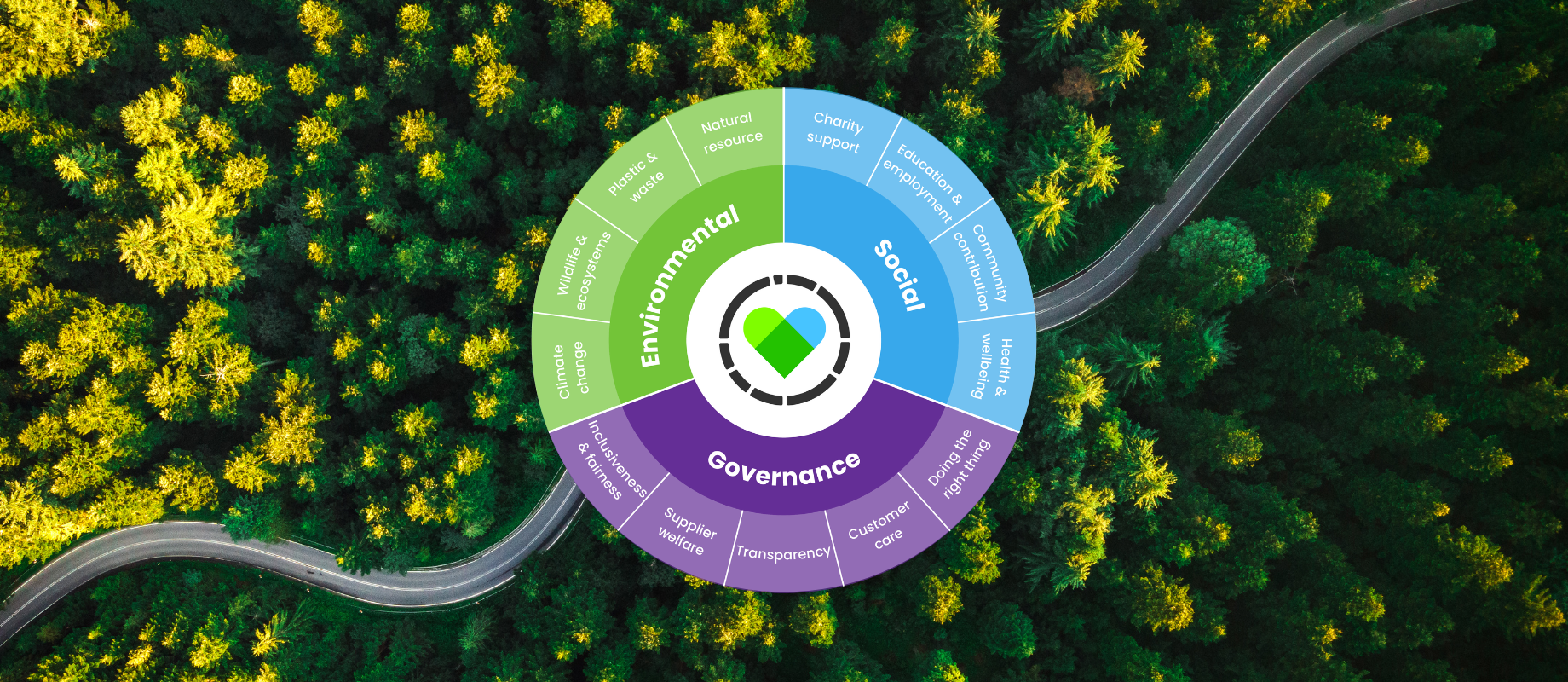New research shows that consumers still expect businesses to do their part for people and the planet, even in these trying times.
But here’s the twist: those expectations aren’t based on what might be considered the biggest issues – rather, it’s the things that affect them more directly that matter. That means specific environmental concerns and ‘good’ corporate behavior.
And it turns out younger consumers have a broader set of expectations than their elders and are especially tuned in to social considerations. Read on to learn the differences between markets and consumer groups.
Background
Understanding consumer expectations regarding ESG initiatives is crucial for brands, because it influences purchase behavior. According to a recent Deloitte study, 46% of consumers purchase at least one sustainable good or service each month, despite tough economic conditions. Glow’s own analysis suggests that one in two US consumers have switched food and grocery brands recently based on sustainability considerations.
To delve deeper into these expectations, we conducted a survey with a representative sample of adults in the US, UK, and Australia from April-June 2023. The survey captured the views of over 40,000 respondents (US n=15,262, UK n=11,192, Australia n=15,528) and asked them about their opinions on where businesses should focus their sustainability efforts.
Consumers were presented with 13 social, environmental, and governance drivers, and asked to choose which one they felt was the most important for brands to focus on. They also had the option to select none of them. The results, aggregated against the three ESG pillars, are outlined in the article below.
Read on, or jump to what’s most relevant for you:
Environmental concerns take a back seat to good corporate citizenship
Surprisingly, environmental concerns aren’t at the top of the list in all three markets. Instead, good corporate citizenship seems to be a priority for many consumers in the US and Australia. In the UK environmental concerns do come out on top, however governance considerations are also high priority, coming in just behind. It’s important for businesses to take note of these trends and prioritize accordingly to meet the expectations of their consumers.
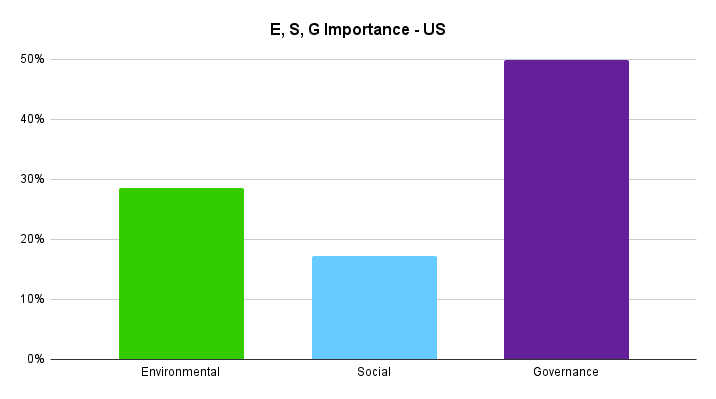
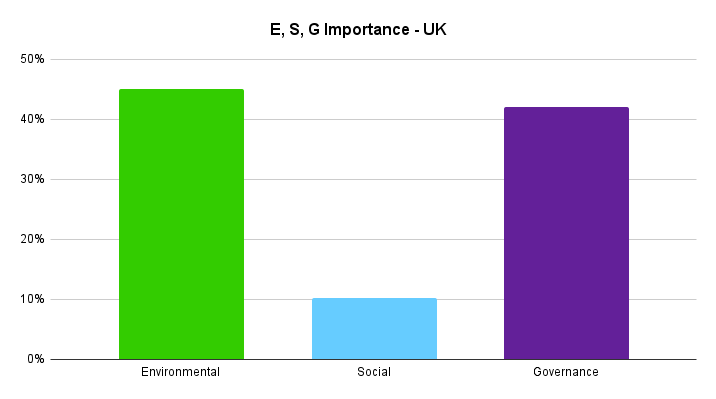
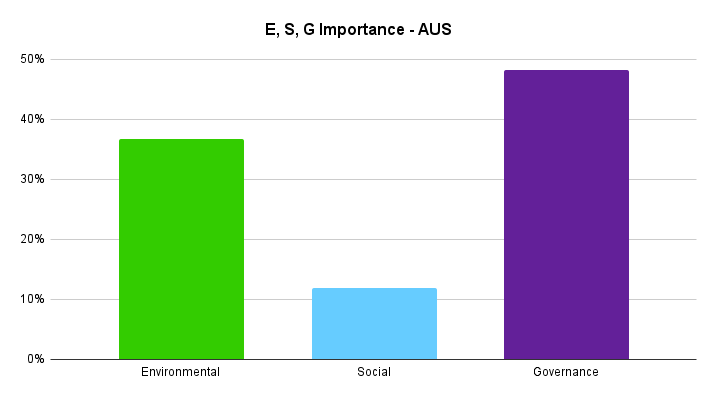
Question: In your opinion, which of the following is the most important area that brands should focus on? (single choice 13 drivers + ‘Don’t know’, responses netted to E,S,G pillar)
It’s interesting that environmental issues aren’t at the forefront of people’s minds, given constant news coverage of the climate crisis and extreme weather events.
Perhaps this is due to the significant amount of coverage on corporate leadership failures, like Elon Musk’s recent Twitter debacle, or the frequent reminders of data breaches resulting from inadequate governance.
No matter the reason, it seems that companies need to focus on improving communication of their good behavior. Consumers are becoming increasingly interested in hearing about the “boring stuff”. This includes paying fair taxes, taking care of their employees, supporting their suppliers, and providing high-quality products at reasonable prices.
It’s important to note that the emphasis placed on each of the E, S, and G pillars varies between markets, and companies must have a nuanced approach to win over consumers in different regions.
The importance of these pillars also varies by industry; what consumers expect from a grocery brand is different to their expectations for a travel or automotive business. There are benchmarks available for specific industries upon request, and we have published several articles on this topic through TriplePundit.
US & Australian brands need to lean into the ‘G’
Australian and US consumers view Governance as the most important issue when it comes to businesses.
In Australia, recent high-profile examples of poor corporate governance, such as data leaks and misuse of information, have left consumers worried about the behavior of businesses, particularly big corporations.
Meanwhile, in the US, poor or unethical leadership has received a lot of media coverage, which may be contributing to the focus on Governance issues. Additionally, the “woke” culture wars have put a spotlight on diversity and equity, further emphasizing the importance of Governance.
In terms of environmental concerns, the US lags behind Australia and Britain, despite being the second largest climate polluter in the world.
In contrast, social issues are a bigger concern for US consumers, with approximately 16% identifying them as the most important issue for businesses to address (nearly 50% higher than other markets).
The specific issues that matter by market
Digging into the individual drivers by market reveals a divergence of priorities.
UK consumers prioritise addressing plastic & waste
One environmental area dominates concern amongst UK consumers; reducing plastic usage and managing waste. This is an important issue that’s been top of mind lately as the country prepares to implement its own version of the single-use plastics ban that was introduced by the European Union last year. For businesses that have a strong plastics story, this presents a great opportunity to showcase their credentials before the law takes effect in October.
If you’re looking to reach your audience effectively, check out this report to learn which channels are most effective for conveying sustainability messages.
Beyond plastics, it’s worth noting that good corporate citizenship and reducing climate impact are also important key expectations from UK consumers.
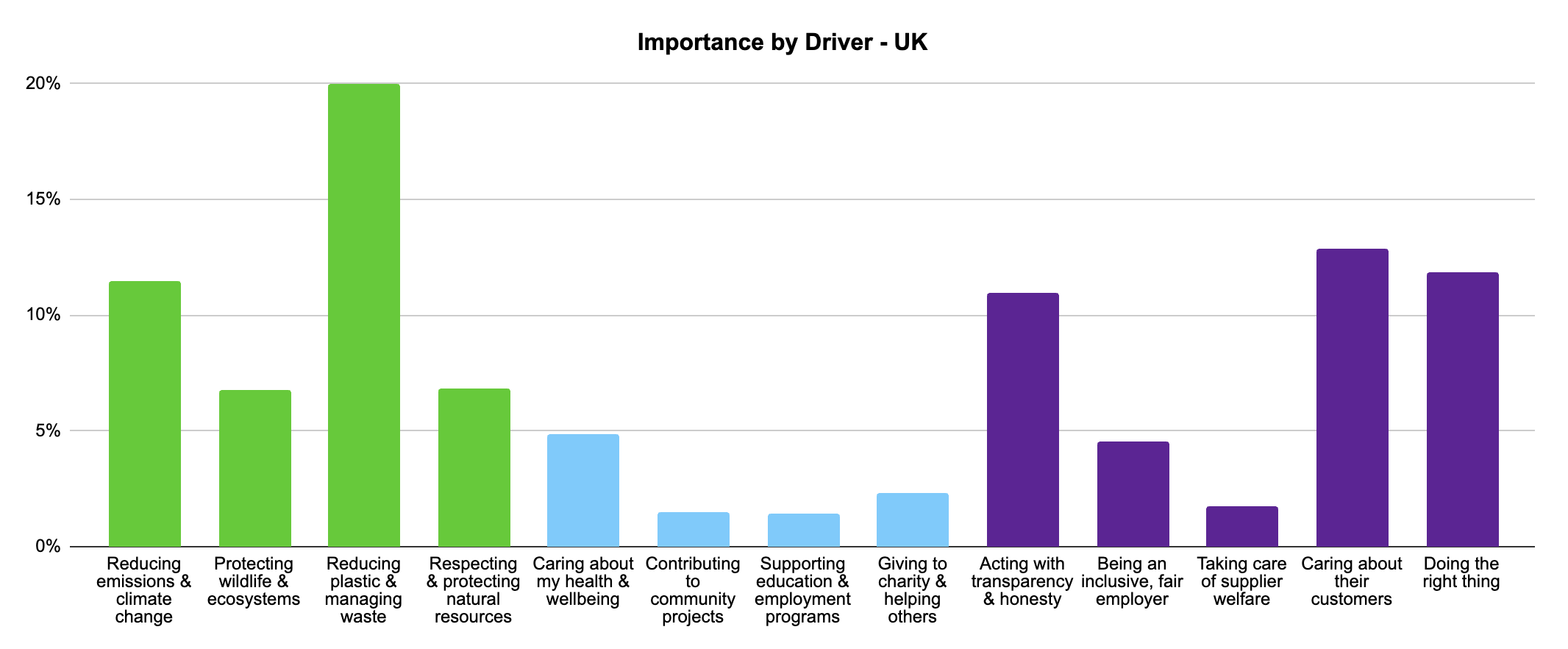
Australians seek a balance from business
It is not surprising that plastic and waste are the top concerns for Australian consumers, much like in the UK, given high-profile failed recycling schemes and the fact that Australians are some of the biggest plastic users globally.
Additionally, the recent data breaches and ethical missteps by corporations have definitely made business ethics a critical topic. It’s great to see that people are paying attention to these important issues.
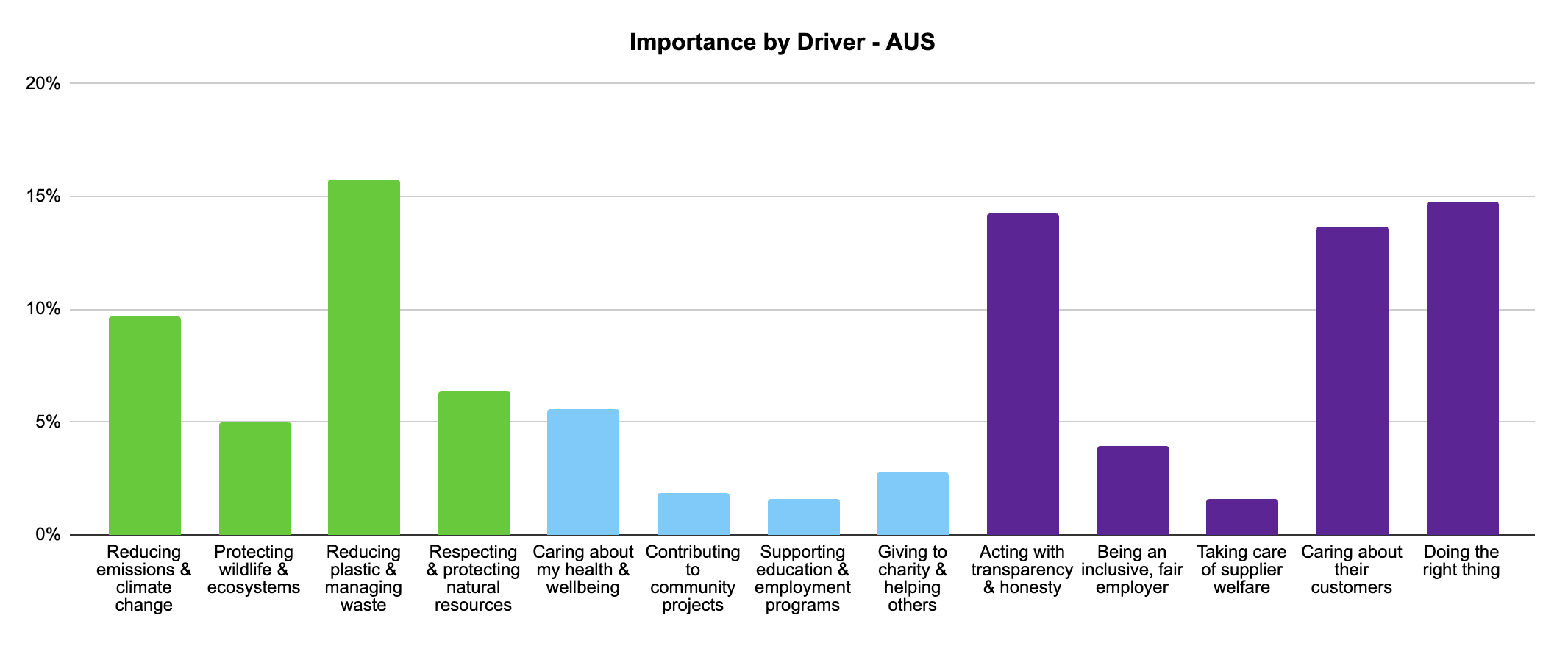
US consumers care less about the environment
US consumers have a different perspective, with all three of the key Governance drivers being deemed the most important areas for business to focus; ‘Caring about their customers‘ and ‘Doing the right thing‘ top the list at 17% and 15%, respectively.
In contrast, the environmental areas are all deemed a lower priority than in other markets. This isn’t unexpected given relatively higher levels of climate skepticism amongst US consumers.
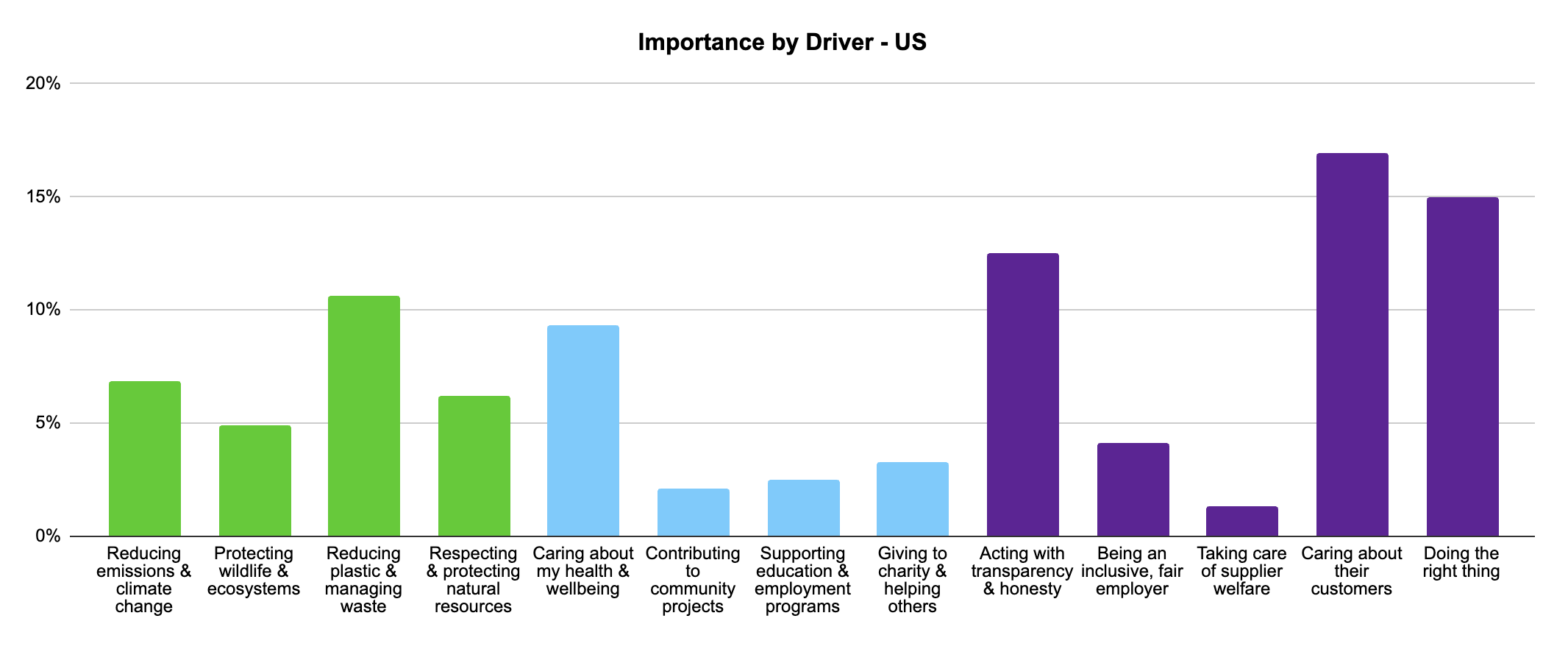
Demographics drive differences
Once the driver analysis is broken down by demographics, patterns reveal greater consistency within cohorts across markets than across cohorts within markets. One such pattern is that of social equality, which is championed by the younger generation.
Social equality is championed by the young
Across all markets, the expectation that businesses should play a role in addressing social issues declines with age. Gen Z and Millennials, in particular, expect businesses to address social considerations such as producing ‘good’ products that support physical and mental well-being, supporting charities, and contributing to community projects.
Interestingly, Gen Z and Millennials also have a broader range of concerns compared to older generations. They expect businesses to be more active across more areas of ESG (Environmental, Social, and Governance) than older age groups. This finding complements other data sets that show younger consumers rate the performance of brands more harshly than older consumers. In combination, the data reinforces that younger generations have higher expectations of brands when it comes to acting sustainably and expect businesses to give back in lots of ways.
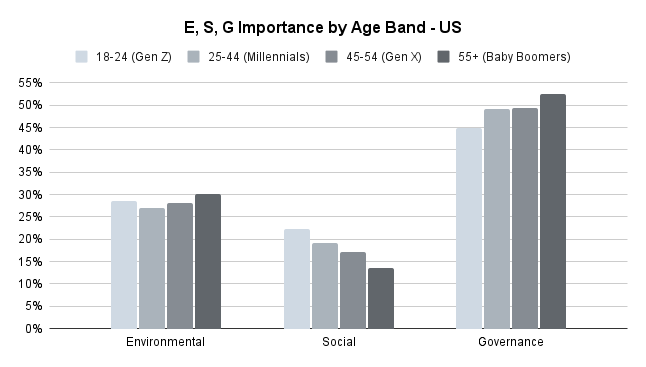
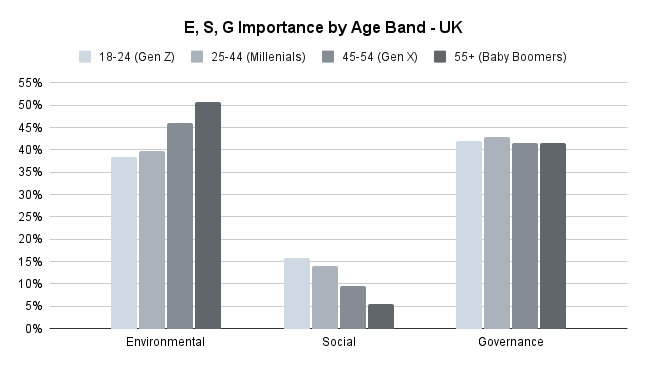
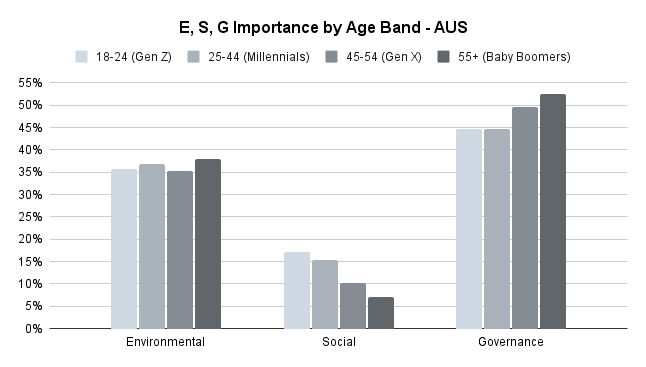
In the US and Australia, older consumers place more emphasis on the need for businesses to be good corporate citizens, particularly around transparency, honesty, and commitment to customer needs. However, in the UK, older generations more than younger expect businesses to support the environment.
Boomers raly against plastic
The environmental area deemed most important for businesses to focus on, by consumers in all markets is ‘Reducing plastic and managing waste’. But the age group that feels most strongly about that is Boomers. Perhaps this is due to a sense of responsibility for the exponential growth of plastic usage during their lifetime?
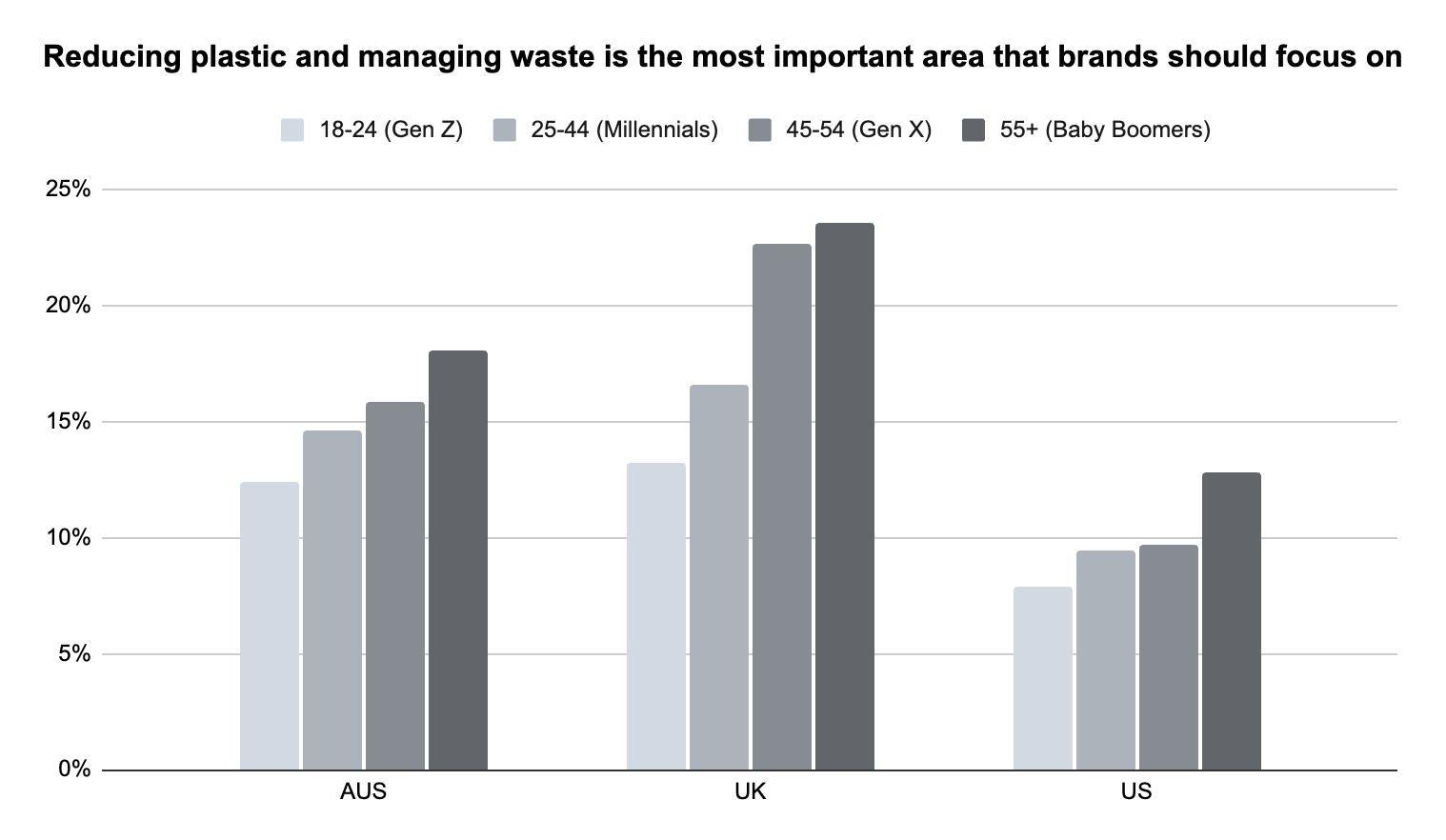
Women prioritize the environment
In all three markets, a higher proportion of women than men want businesses to focus on the environment, particularly ‘reducing plastic and managing waste’. On the other hand, men seem to place a higher value on corporate citizenship opportunities, especially those that prioritize a customer focus.
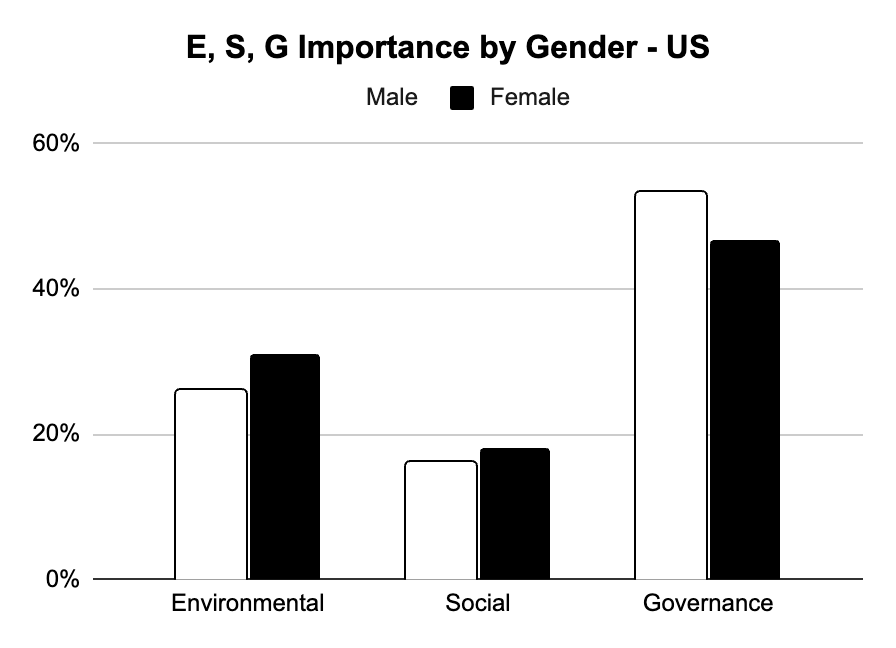
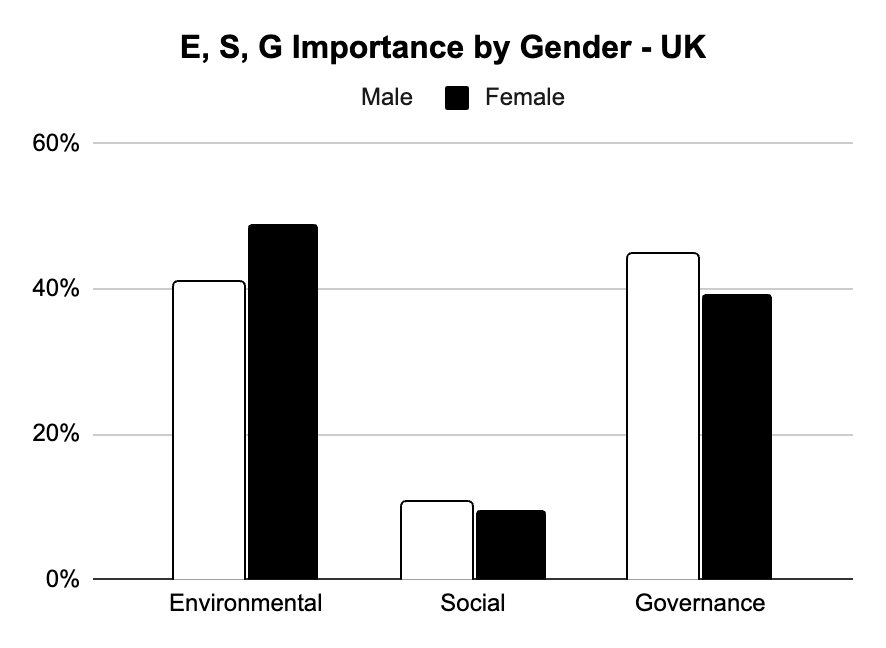
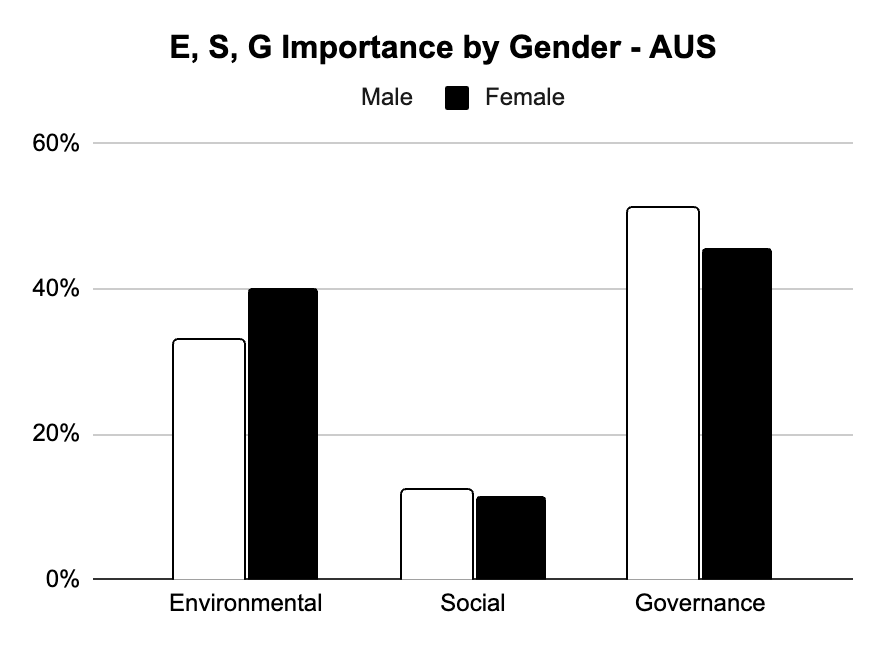
Summary & Implications
Whether your business already has ESG programs in place or is at the early stages of developing an ESG strategy, you need to be clear on what all stakeholders expect of you, including customers and end consumers, because they are choosing brands they believe are leading in sustainability. Without knowing consumer expectations, you run the risk of investing in places that make a difference to the planet but are not important to your customers and prospects, thereby reducing recognition, program ROI, and ultimately, your ability to invest in sustainability.
This analysis highlighted that what consumers care about differs in importance by market, age, gender, and more. Separate analyses have shown that expectations also differ by the industry in which your business operates.
The key outtake is that a successful ESG approach starts with ensuring you understand the expectations of your key audiences. From that, you can build a strategy that works to make a difference and attract consumers.
If you want to learn more about how to measure what consumers think of your brand’s sustainability performance, read on.
Methodology - ESG Framework:
The analysis framework used above was developed over 18 months from over 100,000 data points across three markets. These drivers represent the synthesis of over 60 ESG issues to identify the areas with the strongest impact on overall consumer perception. The 13 drivers, their descriptions, and some actions businesses take in each area are outlined below.
| Driver | Pillar | Description | Example brand actions |
| Climate change | Environment | Reducing emissions & climate change | Renewable energy, carbon offsetting, green buildings, electric vehicles, efficient logistics |
| Wildlife & ecosystems | Environment | Protecting wildlife & ecosystems | Protecting habitats, organic farming, responsible fishing, biodiversity conservation |
| Plastic & waste | Environment | Reducing plastic & managing waste | Recycling, composting, sustainable packaging, waste reduction, plastic-free alternatives |
| Natural resources | Environment | Respecting & protecting natural resources | Water conservation, sustainable sourcing, forest conservation |
| Charity Support | Social | Giving to charity & helping others | Charity donations, disaster relief efforts, fundraising events |
| Education & employment | Social | Supporting education & employment programs | Apprenticeships & internship programs, employment opportunities for disadvantaged groups, educational scholarships |
| Community contribution | Social | Contributing to community projects | Supporting community projects, volunteer programs, supporting local schools, sports teams & businesses |
| Health & wellbeing | Social | Caring about my health & wellbeing | Healthy product options, allergen-free products, nutritional information, healthy cooking tips |
| Doing the right thing | Governance | Doing the right thing | Modern slavery protection, anti-corruption policies, regulatory compliance, ethical & sustainable business practices, fair tax payment |
| Customer care | Governance | Caring about their customers | Product quality & safety, customer satisfaction, customer data protection, ethical marketing practices |
| Transparency | Governance | Acting with transparency & honesty | Anti-corruption policies, data privacy protection, clear labeling |
| Supplier welfare | Governance | Taking care of supplier welfare | Ethical sourcing, sustainable supply chains, supplier code of conduct, fair trade policies |
| Inclusivity & fairness | Governance | Being an inclusive & fair employer | Equal opportunities, diversity & inclusion initiatives, safe working conditions, fair compensation, employee benefits, staff training & development |

How to Tell your Brand’s ESG Story to Win Customers
This article was originally published in Greenbook. The research is clear, investing in environmental, social, and governance (ESG) programs creates short and long term business

The most (and least) socially responsible industries in Australia
(Updated with latest data March 12 2022) We recently utilised Glow’s unique ESG (environment, social and governance) measurement methodology to test how socially responsible consumers
